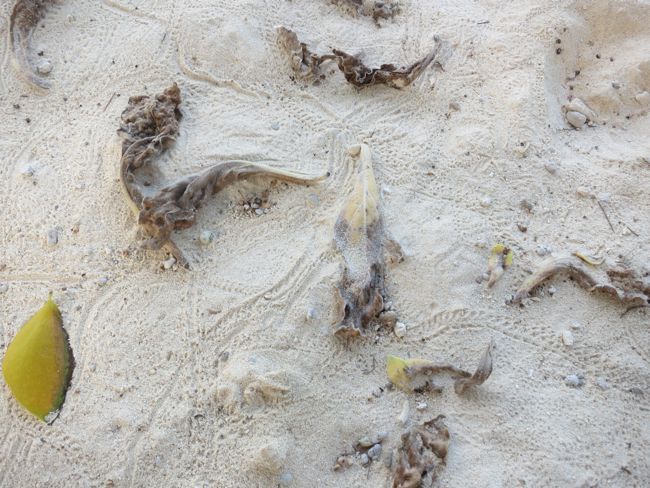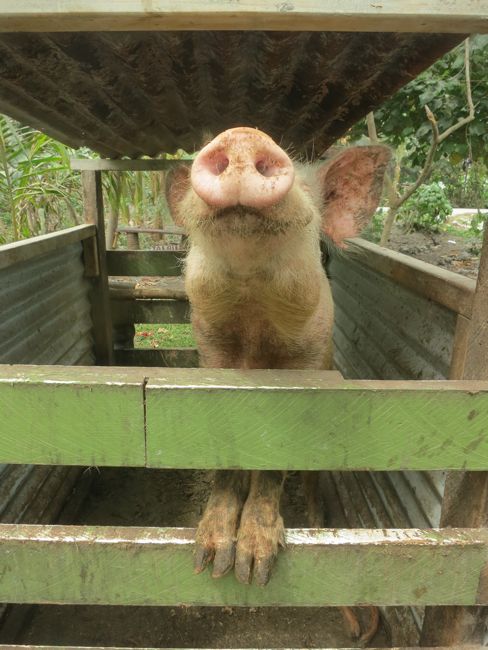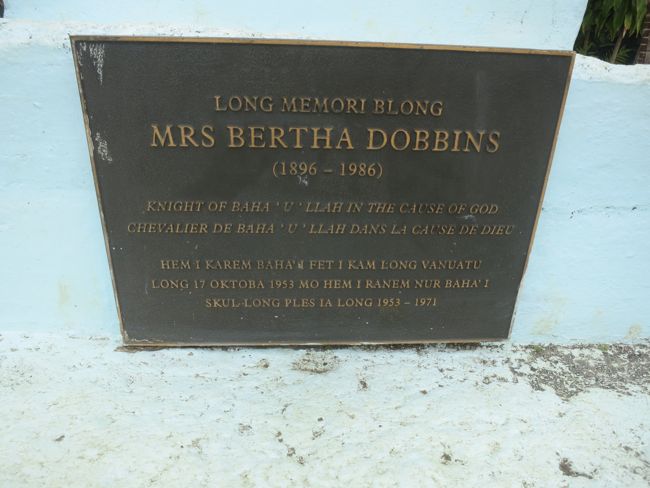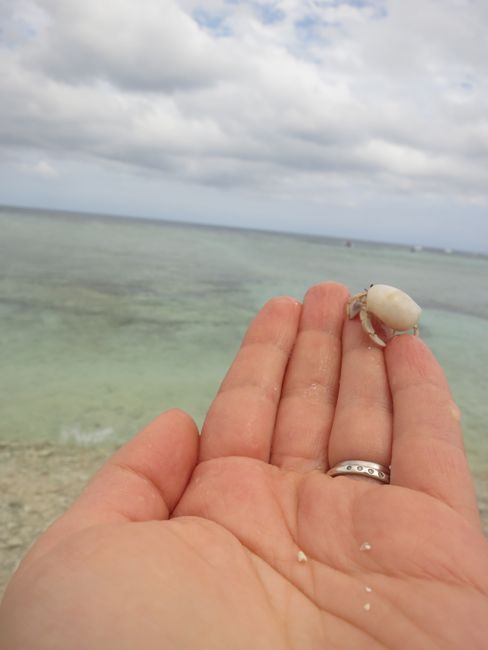Vanuatu is a nation in the South Pacific made up of eight main islands, and 79 further small islands . The islands are a united nation not out of any shared (original) language or culture, but out of shared colonial history: the great European powers in the Pacific, in their infinite wisdom, decided these islands would make a governable grouping based on a map, not on any links between the people.
The national language of Vanuatu, and the one language that you can guarantee an Ni Vanau will speak, is bislama. As well as bislama, each Ni Vanau will speak one or more of the 100+ native Melanesian languages (making Vanuatu the most language dense country in the world), and possibly English, or French, or both.
I was first exposed to bislama a year and a half ago, staying in a backpackers in the Hawke’s Bay. A group of young Ni Vanautu men in New Zealand as seasonal workers, picking peaches and nectarines, were also at the backpackers. They were shy and giggly, talking to my sister and I with their heads ducked, turning to each other and talking in bislama, trying to interpret and translate our questions about their country and culture into words both parties would understand.
The problem was not just words: it was worlds. Hawaii and New Zealand are very similar culturally: first world, Western, developed. The kanaka maoli culture of Hawaii and the tangata maori culture of New Zealand are very similar: parallel customs and traditions, each with a single language, with minor dialectical changes based on region (note the similarities in the terms for native people).
Vanuatu is a whole different world: third world, multiple languages and customs, undeveloped. Because I’d only seen islands that looked like mine: like Hawaii, like New Zealand, like Samoa and Tonga, I struggled to comprehend a Pacific culture that was so different.
And then, listening to the fruitpickers talk in bislama as they tried to translate our questions, and ask us things in return, I realised that they were speaking English. Well, all their words were English: heavily accented, rearranged, said very quickly, and not always used in a way we would expect, but definitely English.
Because bislama is English: a form of pidgin English: heavily accented, rearranged, said very quickly, and not always used in a way we would expect. And it’s the national language!
In understanding bislama, and what it is, and where it came from, I was finally able to understand Vanuatu a little bit.
Vanuatu’s national language is bislama specifically because there are over 100 native languages, and because the Western colonial powers (England and France, to be precise) shoved a random assortment of islands into one country without regard for any unity of culture, and for one, further, terrible reason: blackbirding.
Blackbirding is essentially slavery in the South Pacific. In the late 19th century different European powers began developing industries in the Pacific that were dependent on large amounts of hard labour.
In Hawaii, these industries were sugar cane and pineapple, and they recruited workers first from the Azores in Portugal, then in huge numbers from China and Japan, and finally from the Philippines. The descendants of these recruits make up Hawaii’s multicultural population (for a really good introduction to immigrant labour in Hawaii, try to find a film called Picture Bride, about an early 20th century Japanese ‘picture bride’ who comes out to marry a sugar cane worker). In Fiji, the English brought in workers from India. For the sugar cane plantations of Queensland in Australia, and the tin mines of the Solomon islands, as well as for copra plantations and phosphate mining on other Pacific Islands, the mine and plantation owners looked closer to home: to the myriad small islands of Vanuatu and the Solomons.
In the Azores, China, Japan, India & the Philippines, recruits to Pacific islands may have been mislead as to how rosy the prospects would be in their new homeland, but they were (usually) came willingly, of their own accord.
In the Pacific islands most islanders had no desire to leave their idyllic homes, and blackbirders resorted to force. Islanders were tempted on to ships with promises of trade, or, once Christianity had taken hold, called to revival meetings by blackbirders pretending to be missionaries. Sometimes brute force was used to kidnap whole villages.
Those too young, old or weak to work were sometimes tossed overboard too far out to sea to swim back, and conditions onboard the ships were so horrific, so death rates were incredibly high. The fate of those who did survive the initial journey wasn’t much better. Working conditions on sugar cane or copra plantations were hard, and in the tin mines, even worse.
Along with poor housing, poor food, and backbreaking labour, the one thing most places with a conscripted labour force had in common was a mass of people who didn’t speak the same language, and an overseer who almost always spoke English. The result was the beginnings of bislama: the one language all the workers heard, and needed to understand a little of to survive, was English. Picking it up allowed them to communicate with each other, and to follow the orders that were given.
After 3 years of work (depending on the area), a worker who had been blackbirded was supposed to be taken home with whatever they might have earned (usually nothing, as they were charged for food and housing at rates higher than their pay). There was enormous profit for the blackbirders in collecting workers, but none in getting a worker home, so blackbirders weren’t too particular about taking people back to where they had been stolen from in the first place. In the early years of blackbirding, many workers who had managed to survive the initial trip out, and their years of labour, were killed (and sometimes eaten) because they were dropped on an island where they were a stranger.
Unsurprisingly, once many islanders realised that interactions with outsiders could have horrible aftermaths, they fought back. The next ship to visit an island that had been the victim of blackbirding often found itself under immediate attack: some blackbirders where wiped out this way, but legitimate missionaries and traders also suffered the consequences of the blackbirders duplicity. Once bitten, the Ni Vanautu and other islanders bit first (often literally, because cannibalism was widely practiced in Vanuatu) when it came to Western ships.
Although defensive attacks made it harder, and blackbirders were sometimes charged with murder if they killed too many islanders in a collecting trip, the practice was so lucrative, and so far away from the eyes of most of the Western world that might have condemned it, that it continued up into the early 20th century. It was missionaries who can claim the most credit in ending blackbirding: they campaigned to have it be made illegal almost as zealously as they attempted to convert the islanders.
For those islanders who survived both their years of conscripted labour, and their return home, they took with them the bits of English they had learned, tacked them on to a Pacific language grammar framework and used them to communicate with missionaries and traders, and with anyone in the next village or next island over who spoke a different native language, but now shared a common, if broken, tongue.
Over the years bits of French also got mixed into bislama, because France had joint control over Vanuatu with England for most of the 20th century, and a French-based bislama is spoken in Vanuatu’s neighbor, New Caledonia. In fact the name bislama is French based: it’s a corruption of beche la mer (sea slug).
The final reason bislama is predominantly English based, and the universal language of Vanuatu, is World War II. Thousands of American servicemen (and probably a few women) descended on Vanuatu during the war and used the islands as a launching pad for campaigns in the Solomon Islands and the Philippines.
The war is still a huge deal in the islands (where it is still ‘the war’). Tourist attractions in Vanuatu today include a disused landing strip, the offshore wrecks of planes that ran out of fuel before the landing strip, diving the wreck of the USS President Coolidge, and a WII museum with sundry artifacts left behind, plus the cultural attraction of a cargo cult that worships a mythic American serviceman, John Frome (and if you think that is weird, wait until you hear about the one that worships the ‘nambawan bigfella him blong mizzes kween‘ (bonus points if you can sound that out and figure out who it is before googling it)). While they were in Vanuatu the Americans built a road around the main island of Efete, and talked with the locals in basic English, helping to solidify bislama as the lingua franca.
Because most of the words in bislama are English, you can communicate between bislama and most English dialects using the main words, so the servicemen found themselves able to talk to the locals, and vice versa.
It doesn’t matter if you say ‘What’s your name?” or “Wot name blong yu?”, as long as you catch the “name” part.
Some of the usages are a little different: tumas (too much) where we would say ‘very much’: tank yu tumas, me likem tumas.
Some sound like a cliche of pidgin: yu savvy? (do you know/are you familiar with) from the French save.
Some were very hard for me to say, because through my cultural lense they are unacceptable: pikinini for children, for example.
Some look and sound like a completely foreign language until you think about them: yumi (us, we) from you-me. Yumi likem tumas.
And some are just like Hawaiian pidgin and make me feel at home: where yu stay? (where are you from/where are you); be dere bumbae (I will be there by-and-by).
But instead of saying da kine for good/the best as we do in Hawaii, in Vanuatu they say nambawan (number one).






Oooooh.
As a student of English who’s just taking a course in sociolinguistics this semester, and in fact is likely to run across pidgins and creoles very soon, I *LOVE* this post 🙂 (Incidentally, we’ll be using a new textbook, published this year, by a linguist named Bell – forgot the first name – who’s from New Zealand, so apparently there will be a lot more New Zealand in my studies now than there has been so far.)
That bigfella is someone British, definitely. Not sure if it’s meant to be the queen’s husband or someone else. 🙂
Hawaiian Creole English (‘Pidgin’ it is known locally) was imperative to learn in order to help teach Karate at the local Japanese Cultural Center in Honolulu. It’s fun–and you will have so much fun learning about pidgins and creoles.
I grew up speaking English with my mum and Spanish and Spanglish with my dad. I currently work in an environment where all three languages and dialects are spoken and I love the varied linguistic communications and semantic shifts that occur with codeswitching. In fact, I’m headed off to the local daycare to help with their Hispanic Heritage Month celebrations and read stories in all three. I’m looking forward to it, and feel proud to be part of the movement in the US that is helping elevate all of its cultures to equal status. (hugely important and even political in the current racially-charged climate)
I had no idea of blackbirding–how awful, I feel sick to my stomach at the thought of it. Very similar to how I feel when I read anything pertaining to the slave voyages in early American history or the Holocaust in Europe.
I’d love thoughts on the following concept: I used to get nightmares and cry for the people when reading stories like these, and they still bother me greatly–as they should bother everyone. Now, each time I read about horrific situations, I feel inspired to do works of good for others. (I love any excuse to be kind to others, as there is so much need) I find it helps me cope with my empathic reactions, and I like the idea of putting good into the world–especially to erase the evil. Do any other readers process stories of tragedy similarly? How do you all give back?
Although we didn’t have much of the blackbirding in the East Coast of the United States, as you say we did have the slave trade (New Jersey and Delaware still have slaves during the outbreak of the Civil War. Something many people forget.) However, we did have many immigrants come willingly to the US with hopes of a better life only to be put to work for long hours at the factories. If you worked at the factory, you had to rent your house from the factory, buy your clothing and food from the factory store, ect. You couldn’t go elsewhere without being fired from the job you had. Kids as young as five would start to work for as little as a few pennies a day – which even back then was nothing. Many Irish, Italian, and Eastern European immigrants died due to the conditions in the factories.
The story of the strong taking advantage of those they perceive as being weaker than them is an ancient one and does continue today. We still have human traffiking (slavery) all around the world, but particularly in Africa and in Asia. (Remember all those school girls that were kidnapped by terrorists a few months back? The terrorists declared they were going to sell them.) Reprehensible working conditions still exist in China, India, and other parts of Asia as well as South America. Eastern Europe used to have revolting conditions as well but, with the EU rules, those have improved, thank goodness. As long as there is a profit to be made, there will be someone to take advantage of someone else.
Yes. yes yes yes yes yes.
‘yu savvy’. I don’t think you mean ‘save’ (whatever that is) but the French ‘savoir’ (to know, to learn, to realise).
And actually ‘savvy’ is far more likely to have been brought via Britain. In the UK we still use the colloquial word savvy meaning knowhow, shrewdness or understanding. It probably entered the English language through a different form of pidgin English: Anglo-African. Even that might originate either from the French ‘savoir’ or the Spanish ‘sabe usted’. As often happens in languages it could easily derive from either or both. So savvy probably came to Vanuatu directly as a loaned word through either Anglo-African or lower-class white British workers.
Words are complicated, aren’t they? So much history in two syllables.
Hi Emma,
You are right, I meant savoir. However, all my sources on bislama indicate that savvy came directly from French, thanks to the strong French influence in that area of the Pacific (France controlled Vanuatu in a partnership with Britain called the Condominium for most of the 20th century, and at least 40% of the main island still speaks French instead of English as their third language). There is a weird quirk in Pacific English that the British influence is quite upper class, because many islands predominant contact with the outside world was through Colonial administrators who were all upper class Brits, so bislamas don’t tend to include working class slang, unless it has been introduced very recently.
I love the picture of the piggy! There is nothing like tropical tress, sand, and beach to make you feel good.
I love the picture of the piggy too! Mr D couldn’t believe I was photographing them!
This was very interesting. Thank you.
Fascinating! A lot of this information is completely new to me.
I saw a film clip about the Duke’s cult. Apparently, there have been presents. David Attenborough managed to used the link in some of his earlier films.
Blackbirding was deeply shameful. The treatment of the people once they were in the canefields of Queensland was not good at all.
This is absolutely fascinating. I’d never heard of Vanuatu until you started writing about them, and this is a really interesting language. I might just have to send this article to some of my language geek friends!
Thanks! I’m really glad people are enjoying this. Vanuatu is a pretty common holiday destination from NZ and Australia (it’s only a 3.5 hour flight from Auckland), but I think in a lot of the rest of the world people it’s unknown unless you are a serious WWII buff – or really liked the series of Survivor that was filmed there (apparently it made up tons of stuff about how dangerous Vanuatu was for dramatic effect).
Interesting! Quite similar to PNG, except PNG has over a thousand languages, and no common language (though there are two or three trade languages, none is spoken by everyone).
One of them,Tok Pisin (PNG Pidgin), is part English, part German (both for colonial reasons) and part various local languages. Although apparently now it’s officially a creole, not a pidgin, as for some people it’s a first language (often children of parents with no other common language).
One thing which really bugs me is people who assume that any word derived from an English word must be pronounced the same way as that English word – although I’m sure it’s not a mistake you would make!
I have some friends from PNG who speak Tok Pisin. Apparently Bislama is also technically a creole, not a pidgin (just looked it up).
I’m sure that I occasionally do make the mistake of pronouncing English derivatives like English, but I’m far more likely to make the mistake of pronouncing any unfamiliar word like Hawaiian. With an unknown factor, we all revert to what we know. In university I read a bunch of papers by someone with a last name that I read as Kay-oh-HAH-neigh, and though “how cool that a top IR expert is from Hawaii!”. And then I was confused when my professor kept talking about someone named Koh-HAINE. Turns out Keohane wasn’t from Hawaii… 😉
Heh heh.
Because Tok Pisin and Maori have the same ah-eh-ee-oh-yu vowels, I subconsciously assume that all indigenous languages are pronounced that way. Sooo wrong…
The variety in world languages is truly amazing. I’ve even heard of a language with about 37 vowels (!!!) and only a handful of consonants.
I proofed a fabulous dissertation on Tok Pisin. As one of the few native English speakers in my linguistics graduate program, I had the honor of proofreading several theses and dissertations. And that brings up again the practice of trying to say things you don’t know how to say. I guess it comes down to tone: Are you respectful and exuberant, but don’t get it right? Are you willing to correct yourself once you learn? Or do you willfully mispronounce?
It’s such a terrible history, that of blackbirding. Yet another way the people with power in Australia have committed atrocities against those that don’t 🙁
On a much happier note, I really enjoyed the information on the language, and your own responses to it as well. And – hermit crabs! LOVE!
Australia does have a particularly terrible history, but few countries with a colonizer/colonized history are blameless. My mum pointed out that California had bounties on hunting Native Americans into the 20th century :-/
But I’m glad you enjoyed the post. And yes, hermit crabs! I love them too – that’s one of just dozens I played with on the beach. They are such fun to watch!
All the more reason to learn, remember, and be kind. Maybe with enough cultural shift, we can prevent atrocities from happening again.
Then again, many in US politics are more than happy to let thousands die from preventable diseases than to expand medicare and medicaid. I wish more people would come out swinging and call the willful death of 30,000 poor people a year what it is: atrocity based on social class.
This blog always works to be kind to others, and it’s a real pleasure to read. Thank you so much for your positivity!
I essentially translated the other cult following, but then second guessed myself because I couldn’t believe it was actually a thing! Googled it, and wow. @_@ So interesting. I really liked your explanation of the similarities between NZ and Hawaii and the languages of Vanuatu. I love all the sewing posts of course, but I love your explanation posts of everything too — hooray curiosity! 🙂
Hehe. Pretty funny isn’t it! Yep, it’s a thing!
I’m really glad people like this posts too. It’s a lot easier to write the ones on sewing, or fluffy ones showing pretty things or Felicity (pun unintentional!), but I love that there are so many people who actually do want to learn about new stuff – which is what I follow lots of blogs for!
Fascinating!!